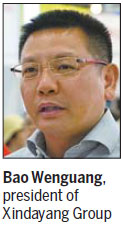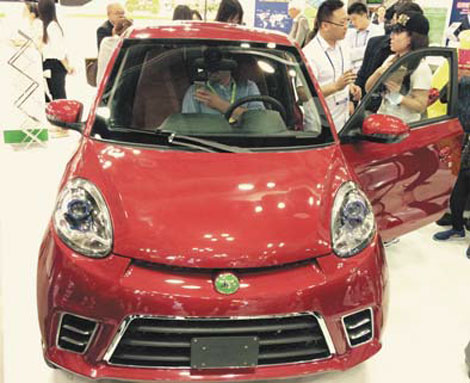Xindayang aims to lead charge in China's green vehicle market
While it might not be a household name in China's auto market, domestic electric carmaker Xindayang has one lofty ambition: to be the nation's leader in the mini electric vehicle market.
"We are aiming to be the leader in what we call the 'city mini EV market,'" said Bao Wenguang, president of Xindayang Group and CEO of Xindayang Electric Vehicle Technology Co Ltd.
One key goal in the 14-year-old company's ambition includes domestically selling 100,000 units of its ZD D2 mini electric car next year.
|
Xindayang's D2 made its debut at the 28th International Electric Vehicle Symposium and Exhibition in Seoul. Du Xiaoying / China Daily |
The D2 is the company's second electric car model. Its debut - at the 28th International Electric Vehicle Symposium and Exhibition in Seoul, South Korea, in May - comes just one year after the company began selling its D1 model.
The D1 initially made its debut in 2012 purely as a rental car in Italy under the name H1. Xindayang sold 7,400 units of the D1 domestically last year, which accounted for nearly one-tenth of total new-energy vehicle sales in China.
For environmentally conscious consumers in China, the world's second-largest new-energy vehicle market, Xindayang's two-seat ZD brand is an ideal second car for short-distance urban treks.
Founded in 2001, the company made its initial fortune from electric motors and bikes. In 2006, it entered the new-energy vehicle industry. After it rolled out the ZD H1, it established a joint venture with Geely earlier this year to continue producing the ZD line of electric cars. The H1 then got its name change to D1.
According to d1ev.com, a website that specializes in new-energy vehicle news, the company ranked among the top three domestically in the sales of pure electric vehicles. Bao said he is confident about the future of the D2 and predicted that the micro car market would reach 15 to 20 million units in sales in China in the coming years.
"The new-energy vehicles is urgently needed in China", Bao said, "and the country is taking environmental protection and the development of green energy seriously."

Burgeoning market
With greater public awareness of environmentally friendly vehicles and the need for sustainable growth, China's green auto industry is booming.
To encourage sales of new-energy vehicles, the government has established preferential policies to consumers.
According to the China Association of Automobile Manufacturers, the country's new-energy vehicle production almost tripled to 27,271 vehicles year-on-year in the first quarter. Sales increased 2.8 times over the same period, reaching 26,581 units.
Last year, 78,499 units of new-energy vehicles were produced, 3.5 times higher than in 2013, while sales more than tripled to 74,763 vehicles.
Chen Qingquan, chairman of the World Electric Vehicle Association and an academic at the Chinese Academy of Engineering, thinks small electric cars are the innovative driving force in the new-energy vehicle industry.
"A small electric car is the ideal tool for short urban travels. The new ZD D2 is in a globally leading position among small-sized electric cars. I think the ZD has a bright future in China's niche market," Chen said at the debut of the D2 in May.
The ZD D2 is expected to hit the Chinese market on June 19. Until then, the company refuses to release further details about the model. It is estimated to have a range of more than 180 kilometers, a top speed of 90 km/h and will take six hours for a full charge.
Currently the ZD line is produced in two factories in China with a total annual capacity of more than 200,000 units a year.
The company said its ZD line of autos has more than 400 dealerships in provincial capitals and prefecture cities around the country. The ZD line is also offered as a rental car in major Italian cities such as Pisa, Milan and Modena.
duxiaoying1@chinadaily.com.cn
(China Daily 05/11/2015 page18)















